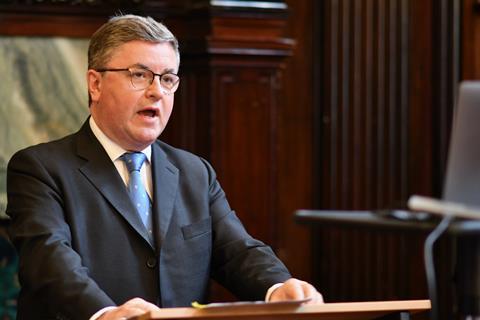Judges in the senior courts are starting to show more restraint in making decisions that overturn government polices, the lord chancellor has said as he prepares to introduce legislation to curb judicial review.
Writing in yesterday’s Telegraph, Robert Buckland MP said it was his duty to prevent the judiciary being drawn into making political decisions. He quoted former Supreme Court president Lady Hale as saying that, in the vast majority of cases JR is the servant of parliament. 'However, in recent times, political controversies have entered the courts in a way which troubles me.’ The 2019 legal cases surrounding the prorogation of parliament are by no means the only examples, he said.
'Many observers thought this was an example of judicial overreach. If this problem exists, the best solution is not legislative, it is judicial restraint,' he added. 'I believe we are now starting to see more of the latter in our most senior courts.'
The lord chancellor made no mention of remarks by Lady Hale’s successor Lord Reed earlier this month condemning JRs brought by ‘campaigning organisations’ against measures for which they had lobbied unsuccessfully in parliament. However made an apparent reference to Mr Justice Chamberlain’s ruling earlier this year denying three opposition MPs standing in a case brought over the government’s Covid emergency procurements. In that judgment, Chamberlain J said: 'In a case where there is already a claimant with standing, the addition of politicians as claimants may leave the public with the impression that the proceedings are an attempt to advance a political cause.'
Buckland said he shared this concern about 'grandstanding by politicians'.

The Judicial Review and Courts Bill, he said, 'seeks to banish the ghosts of judicial review past and to make it fit for the present, to ensure that it is not abused to conduct politics by another means or to create needless delays in aspects of government'.
The proposed legislation will contain two measures to extend the range of remedies at the court’s disposal. One will be to suspend quashing orders, allowing a policy struck down by the courts to remain in place while the law is amended, Buckland said. To illustrate the need for such a power, he cited the 2010 Supreme Court case HM Treasury v Ahmed.
As widely trailed, the bill will also tackle the problem of so-called Cart judgments in deportation proceedings by exempting certain decisions in immigration tribunals from being subject to JR in the High Court. 'Parliament voted to exempt such decisions from judicial review in the High Court for good reason – the Upper Tier Immigration Tribunal has the same status as the High Court. Applying for judicial review to both is simply a duplication of process,' he said.
Buckland concluded in a conciliatory tone: 'I regard myself as a constitutional plumber. This is not a revolution. It is routine maintenance,' he said. However whether this will reassure critics of his reforms in the legal profession and elsewhere remains to be seen.



























13 Readers' comments